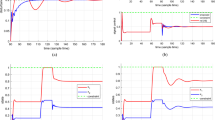Abstract
In this paper, a robust model predictive control approach is proposed for a class of uncertain systems with time-varying, linear fractional transformation perturbations. By adopting a sequence of feedback control laws instead of a single one, the control performance can be improved and the region of attraction can be enlarged compared with the existing model predictive control (MPC) approaches. Moreover, a synthesis approach of MPC is developed to achieve high performance with lower on-line computational burden. The effectiveness of the proposed approach is verified by simulation examples.
Similar content being viewed by others
References
X. B. Hu, W. H. Chen. A modified model predictive control scheme. International Journal of Automation and Computing, vol. 2, no. 1, pp. 101–106, 2005.
X. B. Hu, W. H. Chen. Model predictive control of nonlinear systems: Stability region and feasible initial control. International Journal of Automation and Computing, vol.4, no. 2, pp. 195–202, 2007.
M. V. Kothare, V. Balakrishnan, M. Morari. Robust constrained model predictive control using linear matrix inequalities. Automatica, vol. 32, no. 10, pp. 1361–1379, 1996.
Z. Y. Wan, M. V. Kothare. An efficient off-line formulation of robust model predictive control using linear matrix inequalities. Automatica, vol. 39, no. 5, pp. 837–846, 2003.
Z. Y. Wan, M. V. Kothare. Efficient robust constrained model predictive control with a time varying terminal constraint set. Systems and Control Letters, vol. 48, no. 5, pp. 375–383, 2003.
B. Pluymers, J. A. K. Suykens, B. D. Moor. Min-max feedback MPC using a time-varying terminal constraint set and comments on efficient robust constrained model predictive control with a time-varying terminal constraint set. Systems and Control Letters, vol. 54, no. 12, pp. 1143–1148, 2005.
Z. Y. Wan, B. Pluymers, M. V. Kothare, B. D. Moor. Comments on: Efficient robust constrained model predictive control with a time varying terminal constraint set by Wan and Kothare. Systems and Control Letters, vol. 55, no. 7, pp. 618–621, 2006.
D. Angeli, A. Casavola, E. Mosca. Ellipsoidal low-demanding MPC schemes for uncertain polytopic discretetime systems. In Proceedings of the 41st IEEE Conference on Decision and Control, IEEE, Las Vegas, USA, vol. 3, pp. 2935–2940, 2002.
M. T. Cychowski, B. C. Ding, H. Tang, T. O’Mahony. A new approach to off-line constrained robust model predictive control. In Proceedings of the UK Control Conference, Las Vegas, USA, pp. 146–151, 2004.
B. C. Ding, Y. G. Xi, M. T. Cychowski, T. O’Mahony. Improving off-line approach to robust MPC based-on nominal performance cost. Automatica, vol. 43, no. 1, pp. 158–163, 2007.
Y. I. Lee, B. Kouvaritakis. Constrained robust model predictive control based on periodic invariance. Automatica, vol. 42, no. 12, pp. 2175–2181, 2006.
D. W. Li, Y. G. Xi. Design of robust model predictive control based on multi-step control set. Acta Automatica Sinica, vol. 35, no. 4, pp. 433–437, 2009.
D. W. Li, Y. G. Xi, P. Y. Zheng. Constrained robust feedback model predictive control for uncertain systems with polytopic description. International Journal of control, vol. 82, no. 7, pp. 1267–1274, 2009.
D. W. Li, Y. G. Xi. The feedback robust MPC for LPV systems with bounded rates of parameter changes. IEEE Transactions on Automatic Control, vol. 55, no. 2, pp. 503–507, 2010.
F. Wu. LMI-based robust model predictive control and its application to an industrial CSTR problem. Journal of Process Control, vol. 11, no. 6, pp. 649–659, 2001.
D. Q. Mayne, J. B. Rawlings, C. V. Rao, P. O. M. Scokaert. Constrained model predictive control: Stability and optimality. Automatica, vol. 36, no. 6, pp. 789–814, 2000.
P. Gahinet, A. Nemirovski, A. J. Laub, M. Chilali. LMI Control Toolbox: For Use with MATLAB, Natick, USA: The Mathworks, 1995.
A. Uppal, W. H. Ray, A. B. Poore. On the dynamic behavior of continuous stirred tank reactors. Chemical Engineering Science, vol. 29, no. 4, pp. 967–985, 1974.
L. Magni, G. D. Nicolao, L. Magnani, R. Scattolini. A stabilizing model-based predictive control algorithm for nonlinear systems. Automatica, vol. 37, no. 9, pp. 1351–1362, 2001.
Author information
Authors and Affiliations
Corresponding author
Additional information
This work was supported by National Natural Science Foundation of China (No. 60934007, No. 61074060), China Postdoctoral Science Foundation (No. 20090460627), Shanghai Postdoctoral Scientific Program (No. 10R21414600), and China Postdoctoral Science Foundation Special Support (No. 201003272).
Peng-Yuan Zheng received his B. Sc. degree in electrical engineering and automation from the North University of China, PRC in 2000, the M. Sc. degree in measurement technology and instrumentation from University of Shanghai for Science and Technology, Shanghai, PRC in 2005. He is currently a Ph.D. candidate in the Department of Automation at Shanghai Jiao Tong University, PRC.
His research interests include predictive control and robust control.
Yu-Geng Xi received the Dr.-Ing. degree in automatic control from the Technical University Munich, Germany in 1984. Since then, he has been with the Department of Automation, Shanghai Jiao Tong University, and as a professor since 1988.
His research interests include predictive control, large scale and complex systems, and intelligent robotic systems.
De-Wei Li received the B. Sc. degree in automation from Shanghai Jiao Tong University, Shanghai, PRC in 1993, the Ph.D. degree in control theory and control engineering from Shanghai Jiao Tong University, Shanghai, PRC in 2009. He is currently a postdoctoral research fellow in Shanghai Jiao Tong University.
His research interests include predictive control and robust control.
Rights and permissions
About this article
Cite this article
Zheng, PY., Xi, YG. & Li, DW. An improved robust model predictive control approach to systems with linear fractional transformation perturbations. Int. J. Autom. Comput. 8, 134–140 (2011). https://doi.org/10.1007/s11633-010-0565-x
Received:
Revised:
Published:
Issue Date:
DOI: https://doi.org/10.1007/s11633-010-0565-x




